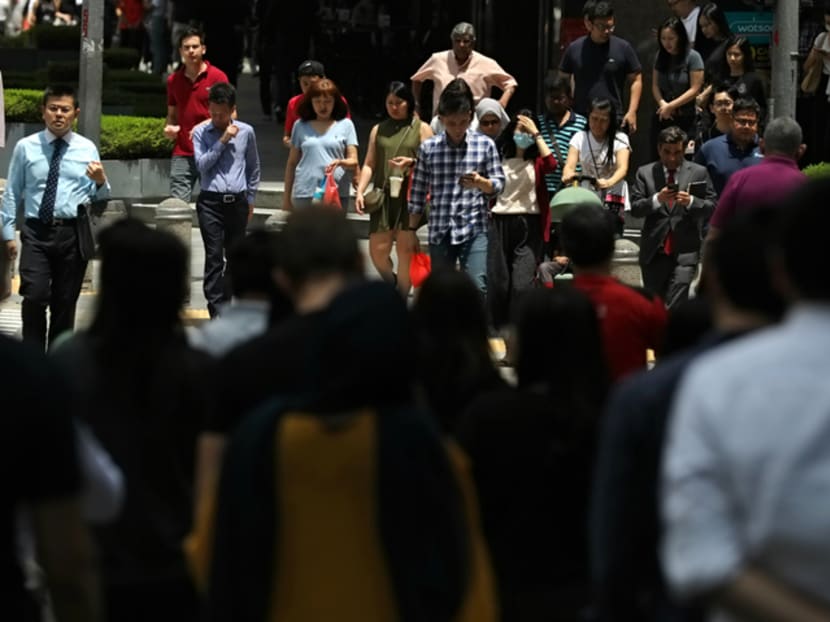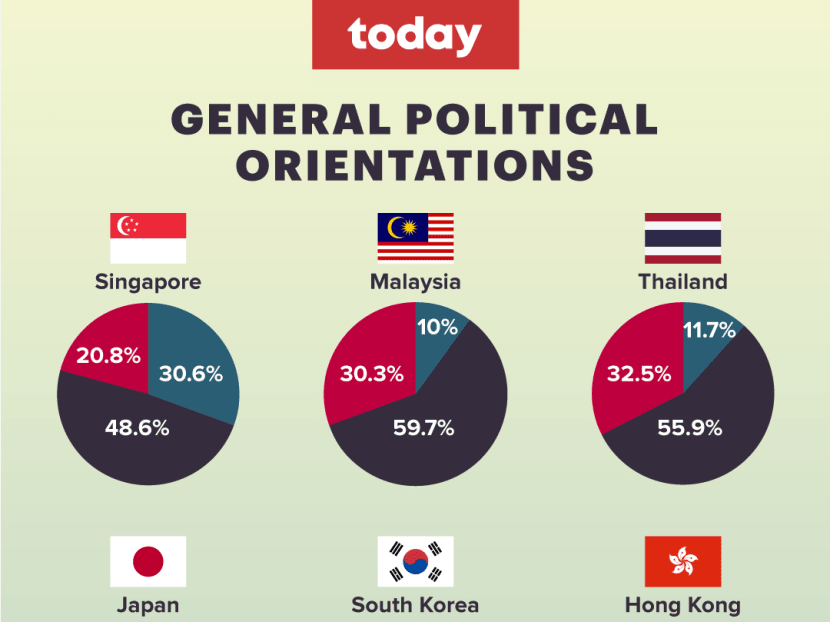Left or right? IPS study finds almost half of S’poreans 'undecided' on political stance
SINGAPORE — While almost half of Singaporeans were somewhat undecided on their political position, nearly a third leaned towards the left, outnumbering the one-fifth who preferred right-wing politics, a study has found.

The IPS study of 2,012 Singaporeans found that they tended to rate politics as a lower priority than other options presented such as family.
- As part of the global World Values Survey, researchers from IPS asked Singaporeans for their views on issues such as politics and their attitudes towards work and family
- The study found that almost half of Singaporeans were somewhat undecided on their political positions
- Nearly a third leaned left while just over a fifth leaned right
- Younger Singaporeans were more likely to identify with left-wing politics
- There was overwhelming consensus that a democratic system is good and that honest elections are important
SINGAPORE — While almost half of Singaporeans were somewhat undecided on their political position, nearly a third leaned towards the left, outnumbering the one-fifth who preferred right-wing politics, a study has found.
By contrast, Singapore’s Southeast Asian neighbours, including Malaysia and Thailand, had larger shares of their population leaning towards the right.
The study, led by researchers from the Institute of Policy Studies (IPS), describes those identifying with the left as typically supporting social equality, liberty, progress and reform, while those preferring right-wing politics tend to support a social hierarchy, order and tradition.
It should be noted, however, that different societies have varying ideas of what constitutes “conservative” and “liberal” policies. Therefore, such comparisons should be used only to see how sure respondents are of their own political stances, based on local understandings of the left and right, the researchers noted.
Overall, Singaporeans rated politics the least important of their priorities among the options presented in the study, which included friends, family, religion and wealth.
The study, titled “Our Singaporean Values”, is part of the 2020 instalment of the global World Values Survey, which takes in 80 countries and studies the changing values of individuals and their impact on social and political life.
The survey asks people in the various countries about their thoughts on a range of issues, including politics, their attitudes towards work, family and gender equality. Singapore had previously participated in the 2012 and 2002 iterations of the survey.
The latest study includes responses from 2,012 Singaporeans in a nationally-representative sample. Interviews were conducted face-to-face from November 2019 to March last year.

YOUNGER SINGAPOREANS IDENTIFY MORE WITH LEFT-WING POLITICS
Overall, the study found that 20.8 per cent of respondents identified themselves with right-wing politics, 30.6 per cent with the left and the remaining “somewhat undecided”.
In contrast, neighbouring Malaysia and Thailand had a higher percentage (around 30 per cent) of respondents identifying with right-wing politics.
The study also found that younger Singaporeans identified more with left-wing politics than older Singaporeans, in line with general trends across the globe.
While 42.7 per cent of respondents aged between 21 and 35 said they identified with more left-wing politics, only 22.7 per cent of those aged above 65 did so.
Some 15 per cent of respondents aged between 21 and 35 said they identified with the right, well below the 31.8 per cent of those aged above 65 who did so.
Outside of these preferences, a large proportion of each age cohort indicated that they were undecided, or preferred not to associate themselves with a particular political stance.
Dr Teo Kay Key, one of the study researchers from IPS, told TODAY that this could be due Singaporeans not understanding what “left-wing” and “right-wing” politics mean, or a desire to adopt a centrist stance rather than choosing sides.
When comparing across education levels, the study found that lower-educated respondents were less likely to support left-leaning political stances compared with the rest of the respondents.
For instance, one-quarter of those with qualifications from the Institute of Technical Education or lower indicated a left-leaning orientation.
Conversely, one-third or more of respondents with a diploma and higher qualifications indicated the same.
OTHER FINDINGS
The study also asked respondents for their views on democracy, the importance of honest elections and their views on other modes of governance.
Perceptions of democracy
No definition of a democratic system was provided to respondents when they were asked for their views.
Over 90 per cent of respondents indicated that a democratic political system is fairly good or very good
This proportion was similar to responses provided in previous iterations of the survey
It was also similar to other countries such as Japan, China and Sweden
Those with higher education levels, higher income and who lived in larger housing types indicated a greater preference for a democratic system
Importance of honest elections
There was overwhelming consensus among respondents (95.4 per cent) on the importance of honest elections
Education and age were positively correlated with perceptions of the importance of honest elections
76.2 per cent of those aged between 51 and 65 rated honest elections as “very important” compared to 60.4 per cent of those aged between 21 and 35 who did so
73.2 per cent of those with a bachelor’s degree and above said honest elections are very important, compared to between 65 and 70 per cent of those with lower educational qualifications
Essential characteristics of a democracy
The study asked respondents to indicate whether certain practices, such as choosing leaders in free elections, and men and women having the same rights, are essential characteristics for democracy.
The top five essential characteristics among Singaporean respondents (from highest to lowest) were: 1. Women having the same rights as men; 2. Choosing leaders in free elections; 3. Civil rights and protection from state oppression; 4. Taxing the rich and subsidising the poor and 5. Receiving state aid for unemployment.
Respondents who had higher educational qualifications or income, or lived in larger housing types, were more likely to indicate civil rights as an essential characteristic of democracy
Respondents who were more educated, affluent and older were more likely to feel that free elections are essential in a democracy
Older respondents were more likely to indicate that taxing the rich and subsidising the poor are essential to democracy, with 63.3 per cent of those aged above 65 indicating so, compared to 53.8 per cent of those aged 21 to 35
Overall, the study said the results show that Singaporeans’ understanding of democracy did not deviate from a conventional understanding of democracy
Obedience to political leaders
35.2 per cent of respondents felt that people obeying their rulers is essential to democracy, a similar proportion to those who were undecided on the question
Older respondents were more likely to indicate obedience as essential to democracy, with 46.7 per cent of those aged above 65 doing so, compared with 24.7 per cent of those aged between 21 and 35
Those with higher education levels were less likely to regard obedience as essential to democracy. About 30 per cent of those with a bachelor’s degree or higher indicated it is essential, compared to about 45 per cent of those with secondary school education and below
Alternative modes of governance
Technocracy, where experts rather than government leaders are decision-makers, was the second-most positively viewed mode of governance after democracy among Singaporean respondents
Just under one-third of respondents indicated positive perceptions of autocratic governance, such as having a strong leader who does not bother with government and elections. This is a relatively higher proportion compared to other polities globally











